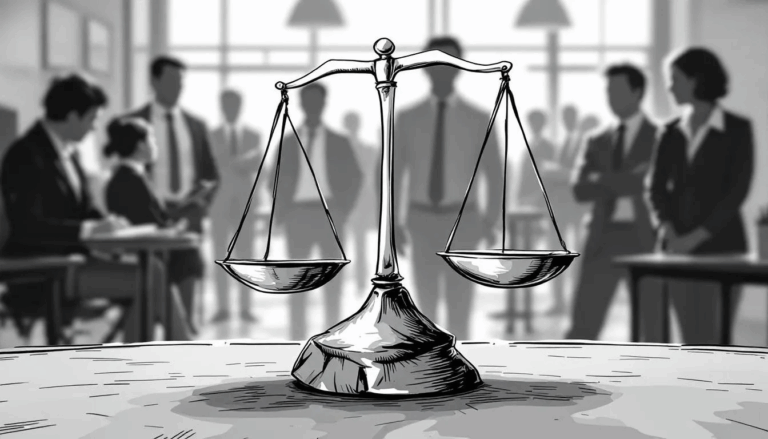Fired Unfairly? A Top Illinois Wrongful Termination Lawyer Won’t Let It Slide
You were fired. But was it legal? Let’s find out.
You give your all at work, and then suddenly, you’re out. No warning, no real explanation. Maybe you got sacked right after asking for disability accommodations. Or maybe your hours were cut in half the moment you reported a manager for making offensive comments. Sound familiar?
At Punchwork Law, we hear these stories every day. And they really tick us off.
If your firing felt personal, shady, or retaliatory, trust your gut. We’ll help determine if you have a case and figure out what to do next. Reach out today for a free consultation, and let’s show your employer what real justice looks like.
What Counts As Wrongful Termination in Illinois?
Wrongful termination happens when your firing clearly violates the law or your employment contract. And yes, you can sue for it.
Let’s clear something up: Just because Illinois is an at-will employment state doesn’t mean your boss has free rein. Employers might be able to fire you for no reason, but never for the wrong reason.
That includes firing you because:
- You reported harassment or discrimination
- You filed a workers’ comp claim after getting hurt
- You took medical or family leave
- You refused to break the law
- You brought up wage theft, unsafe conditions, or other violations
- You’re part of a protected group (race, religion, gender, etc.)
- You participated in a protected activity (like jury duty)
At-will or not, your boss can’t break the law when they show you the door. Not only is this wrong, it’s illegal.
What Doesn’t Count As Wrongful Termination?
Note: Not every firing is illegal. Some are just…earned. If you were let go for legit reasons like poor performance, breaking company rules, being consistently late, or getting caught lying or stealing, that’s likely fair game. The same goes for harassment, threats, or violence in the workplace. Employers can (and should) fire folks for that stuff.
These cases can get messy fast. That’s why you want an experienced Illinois wrongful termination law firm at your side. If your firing was unfair but not illegal, we’ll tell you. And if it was illegal, we’ll fight like hell to get you justice.
Things You Should Know About Illinois Wrongful Termination Law
Here’s the thing: There’s no single law called “wrongful termination” in Illinois. But, combine a handful of state laws, and you get strong protections:
- Illinois Human Rights Act (IHRA): This is the big one. It protects workers from being fired based on race, sex, disability, religion, national origin, sexual orientation, age, and more. Even if you work for a small company, you’re still covered. IHRA applies to employers with just one employee.
- Illinois Whistleblower Act: Told the truth and got canned for it? That doesn’t jive with the law. This piece of legislation makes it clear that you can’t be fired for reporting unlawful or unethical conduct, whether to your boss or a government agency.
- Workers’ Compensation Act: If you were injured on the job and filed a workers’ comp claim, your employer cannot retaliate by firing you. Plain and simple.
- Illinois Equal Pay Act: You can’t be punished for discussing your wages or asking to be paid fairly. This law bans pay gaps based on gender or race and stops bosses from using your old salary against you.
Not sure if your former employer’s actions crossed the legal line? Talk to our team, and we’ll get to the bottom of it together.
How Do I Pursue a Wrongful Termination Claim?
First things first: You’ve got to show that what happened wasn’t just wrong, it was illegal. And when your old boss tries to spin a “legit reason” for firing you? We’re ready for that, too.
It takes solid evidence, sharp strategy, and a team that knows how to hit back. That’s where we come in. Win your case, and you could walk away with back pay, reinstatement, or even the promotion they tried to block.
Ready to take legal action? Here’s what the path usually looks like:
1. Talk To Us
Start with a free consultation. You’ll tell us what happened and how it hurt you. We’ll shoot straight: Is it just unfair — or illegal? If there’s a solid case, we’ll map out your next move. Just don’t wait. Some deadlines come up quickly, and missing one could tank your claim.
2. File a Charge or Complaint With a Government Agency
Most wrongful termination cases start with a formal complaint, usually with the Equal Employment Opportunity Commission (EEOC) or IDHR if it involves discrimination or harassment. Other cases might go through OSHA, or head straight to court.
The tricky part? Filing wrong or missing a deadline can kill your case. That’s why having a lawyer who knows the system matters big time. We’ll make sure it lands where it should, on time, and hits hard.
3. Agency Investigation & Right to Sue
Once you file, the agency investigates, and then your employer responds. You might even get asked for more information or invited to mediation. This step can drag out, but we keep it moving and protect your case. After about 180 days (sometimes sooner if you ask), you’ll typically get a “Right to Sue” letter. That’s your green light to take things to court.
4. File a Lawsuit
With your “Right to Sue” in hand, it’s go time. We draft your complaint, file it in the right court, and kick off the legal battle. Both sides dig into evidence: emails, texts, depositions, the whole nine yards. This is where the truth comes out. If the evidence is strong, expect the other side to come knocking with a settlement offer.
Either way, we’re ready to fight. And we won’t stop the legal punches until the best outcome is achieved.
5. Get a Resolution (Settlement or Trial)
Most cases end in a settlement — sometimes early, sometimes at the last minute. We fight to get you fair pay for what you lost (and then some). If your employer won’t play fair? We go to trial and show a judge or jury exactly why what they did to you was wrong.
We don’t just punch back. We take back what’s yours.
Visit our Illinois EEOC Lawyer page to learn more about filing with the EEOC.
Picking the Right Illinois Wrongful Termination Attorney
Finding a decent attorney can often feel as stressful as the situation itself. Besides, if you were just wrongly fired? Expensive legal fees don’t exactly fit the new budget.
That’s why we offer free consultations for new clients. And in most cases, we work on a contingency fee basis (meaning we only get paid if you win). Why? Money should never keep you from seeking justice.
And for the record: It’s not about who has the fanciest office. It’s about who actually fights for you, picks up the phone when you call, and treats your case like their own.
For the hardest punch, look for an attorney who:
- Understands Illinois wrongful termination law inside and out (along with how federal laws apply to your case)
- Knows how to navigate the EEOC/IDHR process (filing charges, dealing with investigators, responding to statements, etc.)
- Has handled both settlements and lawsuits (because either could happen)
- Explains things in plain English (not legal-speak)
- Treats you like a real person who matters
You should feel confident in their expertise and super comfortable talking to them. If not? Hard pass.
At Punchwork Law, we’re that kind of firm. Our attorneys are down-to-earth, dead serious about results, and ready to stand up to employers who think no one will challenge them.
Dealing with other issues at work? Check out our Illinois Employment Law and Illinois Discrimination Lawyer pages to get the help you need.
What Can Punchwork Do For You?
Worried that you were fired for the wrong reasons? We’re all ears, and we’re already a little angry on your behalf.
You don’t need to sweat the legal stuff — that’s on us. We’ll walk you through every step: paperwork, what to do next, and even job hunting. We’ve got your back, and that’s the Punchwork promise.
Call our team today and see what it feels like to have real fighters in your corner.



